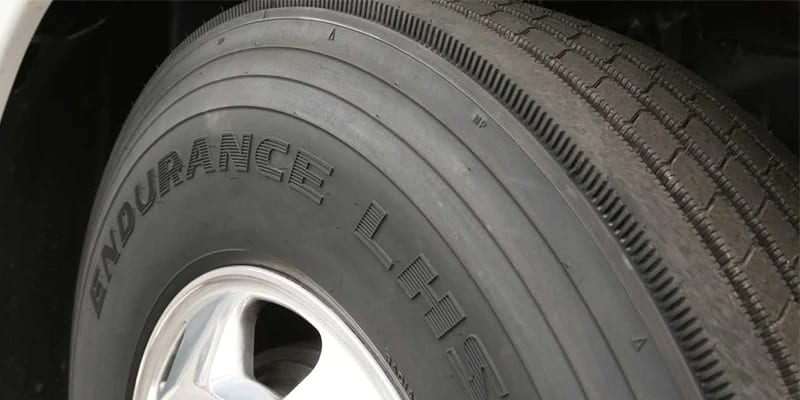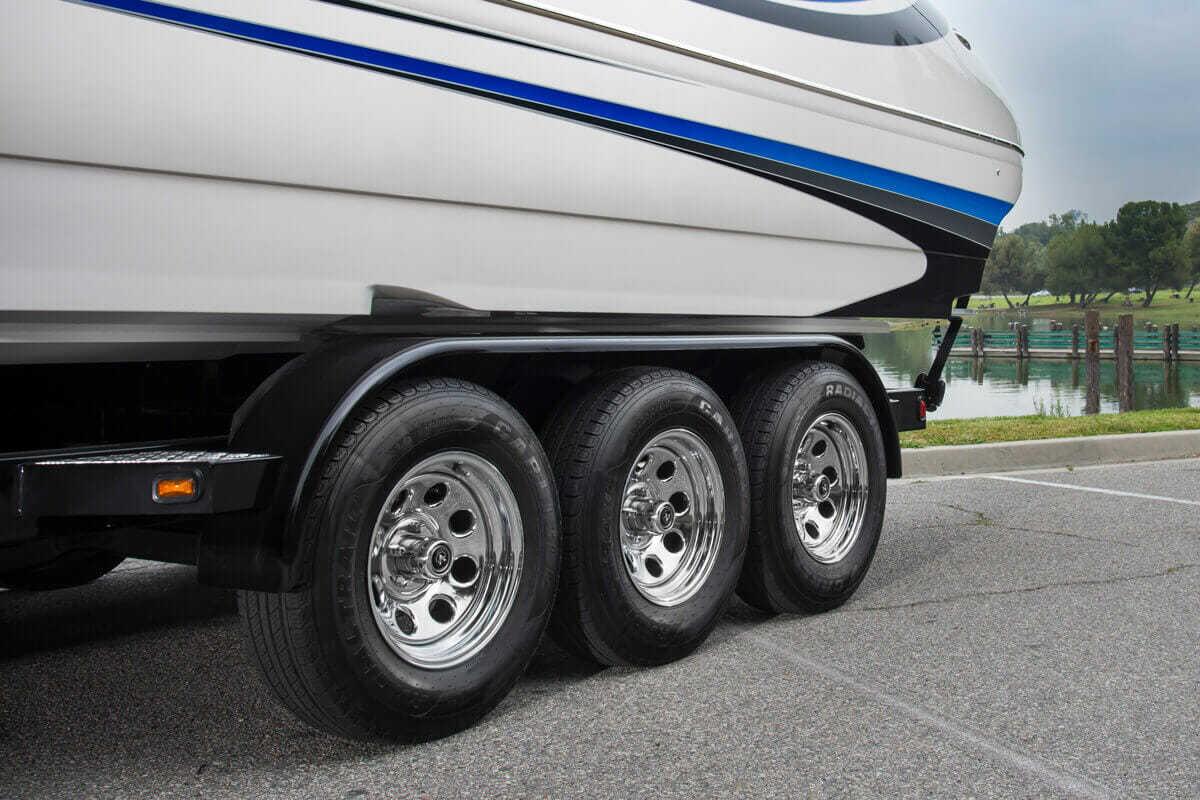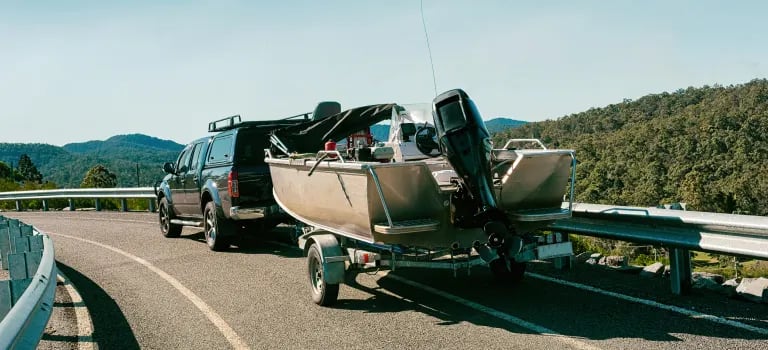Tire Maintenance & Safety
Free shipping
Best price guarantee
SimpleCrew exclusive savings
0% financing options
Tire replacement coverage
24/7 roadside assistance
Easy returns
Trailer tires play a critical role in ensuring the safety and performance of your trailer during towing. These specialized tires are designed to handle the unique demands of carrying heavy loads while maintaining stability on the road.
Selecting the right trailer tires and maintaining them properly can make a significant difference in your towing experience. It not only enhances safety but also extends the life of your tires, saving you money in the long run.
In this article, we'll explore the world of trailer tires, helping you understand their unique characteristics and providing guidance on how to choose and care for them effectively. Let's dive in and discover how to keep your trailer rolling smoothly and safely.
What are Trailer Tires?
Trailer tires are specifically engineered to meet the demanding requirements of towing heavy loads. Unlike regular passenger vehicle tires, trailer tires feature a unique construction that enables them to carry substantial weight while maintaining stability and durability.
One key difference between trailer tires and regular tires is their load-bearing capacity. Trailer tires are designed with reinforced sidewalls and robust internal structures to support the weight of the trailer and its cargo. This enhanced load capacity ensures that the tires can handle the stress and strain of towing without compromising safety or performance.
Another distinguishing factor is the tread pattern and composition of trailer tires. These tires often have a more aggressive tread design that provides excellent traction and stability, especially when navigating challenging road conditions. The tread compound is also formulated to withstand the heat generated by the constant friction and load, ensuring longer tire life and reduced wear.
How to Choose the Right Trailer Tires
Selecting the appropriate trailer tires is crucial for optimal towing performance and safety. The first step in choosing the right tires is to understand your trailer's specifications and weight requirements. Consult your trailer's owner manual or contact the manufacturer to determine the recommended tire size, load range, and speed rating.
Consider the type of towing you'll be doing and the conditions you'll encounter. Will you be hauling heavy loads over long distances, or will your trailer be used for occasional short trips? Different tire types cater to various towing needs:
- ST (Special Trailer) Tires: These tires are specifically designed for trailers and offer superior stability and durability. They have stiffer sidewalls and are ideal for carrying heavy loads.
- LT (Light Truck) Tires: While LT tires can be used on lighter trailers, they may not provide the same level of performance and stability as ST tires, especially when hauling heavier loads.
When selecting trailer tires, prioritize durability and load ratings that meet or exceed your trailer's requirements. Look for tires with a high load index and ply rating to ensure they can handle the weight of your fully loaded trailer. Remember, overloading your tires can lead to premature wear, reduced performance, and even tire failure.
1. Determine Your Load Requirements
To choose the right trailer tires, you must first determine your trailer's load requirements. Start by checking the Gross Vehicle Weight Rating (GVWR) of your trailer, which represents the maximum weight the trailer can safely carry, including the weight of the trailer itself and its cargo.
Ensure that the tires you select have a load rating that matches or exceeds the GVWR. The load rating indicates the maximum weight each tire can support when properly inflated. You can find the load rating information on the tire's sidewall or in the manufacturer's specifications.
Make sure never to exceed the load rating of your tires. Overloading can cause excessive heat buildup, leading to tire failure and potentially dangerous situations. When in doubt, opt for tires with a higher load rating to provide an extra margin of safety.
2. Understand Tire Types
Understanding the different types of trailer tires available will help you make an informed decision based on your specific needs. The two main categories of trailer tires are ST (Special Trailer) tires and LT (Light Truck) tires.
- ST Tires: ST tires are specifically designed for use on trailers and are the preferred choice for most towing applications. They feature reinforced sidewalls and robust construction to handle heavy loads and maintain stability. ST tires provide excellent resistance to swaying and offer improved heat dissipation, making them ideal for long-distance towing.
- LT Tires: LT tires are primarily designed for use on light trucks but can also be used on lighter trailers. While they may be suitable for occasional towing of smaller loads, LT tires may not provide the same level of stability and durability as ST tires when hauling heavier loads or traveling long distances.
When selecting between ST and LT tires, consider your towing needs and the weight of your trailer. For heavy-duty towing or frequent long-distance trips, ST tires are generally the safer and more reliable choice. However, if you have a lightweight trailer and only tow occasionally, LT tires may suffice.
3. Check Tire Pressure Regularly
Maintaining proper tire pressure is essential for the safety and longevity of your trailer tires. Underinflated tires can lead to excessive heat buildup, uneven wear, and an increased risk of blowouts. On the other hand, overinflated tires can cause a harsh ride, reduced traction, and accelerated wear in the center of the tread.
To ensure your trailer tires are properly inflated, follow these steps:
- Use a Quality Tire Pressure Gauge: Invest in a reliable and accurate tire pressure gauge. Digital gauges are often more precise than analog ones.
- Check Pressure When Tires are Cold: Always check tire pressure when the tires are cold, ideally before hitting the road. Tires heat up during travel, which can affect the pressure readings.
- Refer to Manufacturer Specifications: Consult your trailer's owner manual or the tire manufacturer's specifications to determine the recommended tire pressure for your specific tires. This information is usually listed in PSI (pounds per square inch).
- Adjust Pressure as Needed: If the tire pressure is below the recommended level, use an air compressor to inflate the tires to the proper PSI. If the pressure is too high, release air until it reaches the correct level.
Make it a habit to check your trailer tire pressure at least once a month and before any long trips. Regularly maintaining proper tire pressure not only enhances safety but also promotes even tire wear and improves fuel efficiency.
4. Perform Regular Inspections
In addition to monitoring tire pressure, performing regular inspections of your trailer tires is crucial for identifying potential issues before they become serious problems. Make tire inspections a part of your routine maintenance schedule to ensure the safety and longevity of your tires.
Here are some key areas to focus on during your inspections:
- Tread Depth: Use a tread depth gauge to measure the remaining tread on your tires. Most trailer tires have wear indicators built into the tread grooves. When the tread wears down to the level of these indicators, it's time to replace the tires. Insufficient tread depth can compromise traction and increase the risk of hydroplaning on wet roads.
- Sidewall Condition: Examine the sidewalls of your tires for any signs of cracks, bulges, or cuts. These irregularities can indicate internal damage or weakening of the tire structure, which can lead to tire failure. If you notice any concerning signs, have a professional inspect the tires and replace them if necessary.
- Foreign Objects: Check for any foreign objects lodged in the tread or puncturing the tire. Nails, screws, or other sharp debris can cause slow leaks or sudden tire failure. If you find any foreign objects, carefully remove them and monitor the tire for air loss. If the tire loses air pressure, have it professionally repaired or replaced.
- Uneven Wear: Look for signs of uneven wear on your trailer tires. Uneven wear patterns can indicate issues with tire balance, alignment, or suspension. If you notice excessive wear on one side of the tire or in specific spots, have a professional inspect your trailer's suspension and alignment to address the underlying cause.
By conducting thorough inspections regularly, you can catch potential tire issues early and take appropriate action to ensure the safety and reliability of your trailer tires.
5. Rotate Tires to Ensure Even Wear
Tire rotation is an important maintenance practice that helps promote even wear and extends the lifespan of your trailer tires. By periodically changing the position of your tires, you can ensure that they wear down at a similar rate, preventing uneven or rapid wear on specific tires.
The frequency of tire rotation depends on various factors, such as the type of trailer, the load carried, and the driving conditions. As a general rule, it's recommended to rotate your trailer tires every 6,000 to 8,000 miles or as specified by the tire manufacturer.
When rotating your trailer tires, follow these guidelines:
- Rotation Pattern: Consult your trailer's owner manual or the tire manufacturer's recommendations for the proper rotation pattern. The most common pattern for trailers is a front-to-rear rotation, where the front tires are moved straight back to the rear axle, and the rear tires are moved to the front axle.
- Directional Tires: If your trailer has directional tires, which have a specific rotational direction indicated by arrows on the sidewall, rotate them front-to-rear on the same side of the trailer. Do not cross them to the opposite side, as this would result in them rotating in the wrong direction.
- Dual Axle Trailers: For trailers with dual axles, rotate the tires in a crisscross pattern. Move the front tires to the opposite rear position, and the rear tires to the opposite front position. This helps ensure even wear across all four tires.
- Spare Tire: If your trailer is equipped with a spare tire, consider including it in the rotation cycle. This way, the spare tire will be periodically used and maintained, ensuring it's in good condition when needed.
Regular tire rotation not only promotes even wear but also helps maintain the balanced handling and stability of your trailer. It's a simple yet effective maintenance task that can significantly extend the life of your tires and improve overall towing performance.
6. Store Tires Properly
Proper storage of your trailer tires is essential to maintain their quality and extend their lifespan. When your trailer is not in use for an extended period, such as during the off-season, taking the necessary steps to store your tires correctly can prevent premature deterioration and ensure they're ready to go when you need them.
Here are some key considerations for storing your trailer tires:
- Clean and Dry: Before storing your tires, clean them thoroughly to remove any dirt, grime, or debris. Use a mild soap solution and a soft-bristled brush to gently scrub the tires, then rinse them with water and allow them to dry completely. Storing tires while they're still wet can lead to the growth of mold and mildew.
- Cool and Dry Location: Store your tires in a cool, dry place away from direct sunlight and sources of heat. Exposure to excessive heat or UV rays can cause the rubber to deteriorate and crack over time. A garage or a dedicated tire storage area with a consistent temperature is ideal.
- Avoid Ground Contact: When storing tires, avoid placing them directly on the ground, as this can allow moisture to seep in and cause damage. Instead, use tire racks or stack them on a pallet to keep them off the ground. If stacking tires, ensure they are stable and won't topple over.
- Protect from Ozone: Ozone, which is present in the air, can degrade rubber over time. To protect your tires from ozone damage, store them away from electric motors, generators, or other equipment that may produce ozone. You can also use tire covers or wrap them in plastic bags to provide an extra layer of protection.
- Inflate Properly: If you're storing your tires mounted on the trailer, ensure they are inflated to the recommended pressure. Underinflated tires can develop flat spots and weaken the tire structure. However, if you're storing unmounted tires, you can reduce the pressure slightly to minimize stress on the rubber.
- Rotate Periodically: If your trailer will be in storage for an extended period, consider rotating the tires every few months to prevent flat spots from developing. This helps distribute the weight evenly and maintains the tire's shape.
By following these guidelines for choosing and maintaining trailer tires, you can ensure a safer, more reliable towing experience.
5 Best Trailer Tires That Last Long
1. Goodyear Endurance

If you want the best trailer tire for your recreational vehicle that can perform year-round touring over long distances without complaints, then the Goodyear Endurance is the one to go for. Packed with incredible towing capabilities, the Endurance tire has a starting price of $178 and boasts a superb overall SimpleScore of 8.9 out of 10. Thanks to Goodyear’s Durawall technology, the Endurance trailer tire resists cuts, chips, and punctures while hauling heavy goods. Meanwhile, the specialized inner liner reduces air loss for uninterrupted long-distance traveling.
Get Goodyear Endurance tires at the best deals for your vehicle here
2. Hankook Vantra Trail (ST01)

If you do not want to put too much money into a trailer tire but still want a reliable option that can help you deliver consistent hauling and towing capabilities, then the Hankook Vantra Trail (ST01) is an excellent option for you. With an exceptional overall SimpleScore of 9.2, the Hankook trailer tire promises strong durability and traction in dry, wet, and light snowy conditions. While the stiff block pattern enhances its load-carrying capacity, the decoupling grooves of the Vantra Trail (ST01) limit heat generation during long-distance highway runs, leading to a longer service life. The Hankook Vantra Trail (ST01) is available at a starting price of $67 per tire.
Get Hankook Vantra Trail (ST01) tires at the best deals for your vehicle here
3. Carlstar Radial Trail RH

The Carlstar Radial Trail RH is another capable trailer tire that slots between the Goodyear and Hankook in terms of pricing. Costing a modest $83 per tire, the Carlstar trailer tire returns a fantastic 8.2 overall SimpleScore, signifying its great traction, stability, and towing capability in different driving conditions of dry, wet, and light snow. A suitable tire for RVs, horse trailers, and boat trailers, the Radial Trail RH features a low rolling resistance design that reduces friction between the tread and surface for increased fuel efficiency. The optimized tread pattern reduces noise levels for a quiet and comfortable ride quality, while the durable rubber compound returns a longer service life.
Get Carlstar Radial Trail RH tires at the best deals for your vehicle here
4. RBP Conveyor ST

Maybe you need something that’s more affordable yet a decent trailer tire option, consider the RBP Conveyor ST. A specialty trailer tire, the Conveyor ST is incorporated with a tough rubber compound that provides extra rigidity to the carcass for superior durability in different driving conditions. With an overall SimpleScore of 8.0, the RBP trailer tire is best suited for utility, cargo, and boat trailers. Made for high-load carrying capacity, the Conveyor ST provides great traction, grip, and stability on long-distance traveling. Among the most affordable trailer tires available, the RBP Conveyor ST is available at a starting price of $56.
Get RBP Conveyor ST tires at the best deals for your vehicle here
5. Kenda Loadstar K550

A bias-ply trailer tire, the Kenda Loadstar K550 is a great option in the budget category for various trailer types, including boat trailers, utility trailers, and cargo trailers. With an 8.1 overall SimpleScore, the Kenda trailer tire features solid construction and a special rubber compound to withstand the demands of towing over longer distances. The non-directional tread pattern of the trailer tire promotes even wear while resisting uneven wear throughout its lifecycle. The Loadstar K550 is tagged at a starting price of $62, assuring great value over your investment.
Get Kenda Loadstar K550 tires at the best deals for your vehicle here
Remember, investing in quality tires and taking care of them properly will pay off in the long run, saving you time and money. When you're ready to find the perfect trailer tires for your needs, shop for tires online with us and discover the best deals available.
Ready to find the perfect tires?
Search By